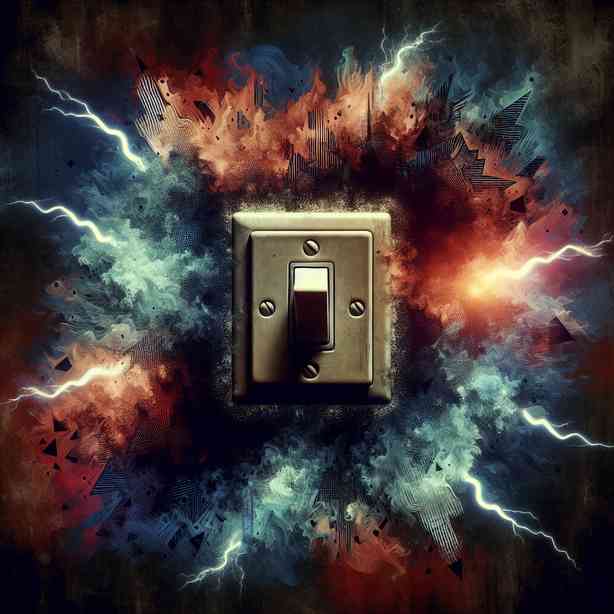
The sound of a dying switch can evoke various emotions and thoughts—each carrying a multitude of meanings and implications. As we delve into this topic, it’s essential to explore not only the literal interpretation of a “switch” but also how it symbolizes change, transition, and the fragility of our existence. Whether we are discussing a physical switch related to technology or the metaphorical switches in our lives, this idea can resonate on both personal and societal levels.
Firstly, let’s consider the literal sense: an electrical switch that is nearing its end of life. The sound of a switch failing could be a quiet click or a jarring crackle, revealing the vulnerability inherent in the devices we rely on. This sound often serves as a signal that something is amiss—not just for the object itself, but for the function it serves in our daily lives. When a switch dies, it disrupts the flow and can bring our routines to a halt. Technologically, this emphasizes our dependence on electrical devices, and how their failure can impact our lives significantly; for instance, consider the inconvenience caused by a broken light switch or a malfunctioning appliance. These mundane, everyday instances serve as reminders of how tied we are to the functions of technology.
Beyond the literal interpretation, the symbolism of a dying switch can evoke reflections on change and transition. A person’s life often hinges on decisions akin to “switches” that lead to transformative moments. For example, an individual may face a decision that requires a significant shift—a career change, moving to a new city, or even altering personal relationships. These decisions can feel like pulling a switch; they mark the transition from one state of being to another.
In this context, the sound of a dying switch could symbolize the anxiety and uncertainty that accompanies change. It’s common to feel a sense of disquiet during such transitions, as our familiar routines and comforts begin to fade away. The ‘click’ of a switch can be interpreted as the sound of opportunity knocking, but it may also echo the fears and doubts that surface when embarking on the unknown path. People often find themselves grappling with mixed emotions during such times—hope and fear coexisting as they navigate the challenges and possibilities ahead.
Furthermore, examining societal switches can offer profound insights. Consider social movements, political changes, and technological advancements which often operate on a grander scale. When a societal norm begins to shift—such as the move towards social justice or environmental sustainability—the ‘switch’ is often accompanied by a cacophony of voices. This sound can be described both as the harmony of collective effort and the dissonance of conflicting opinions and values. The failure of old systems can reveal the ‘dying sound of a switch,’ urging communities to adapt and evolve.
However, the transition brought about by such societal shifts is rarely smooth. A dying switch can also represent the resistance faced by individuals and organizations that cling to outdated norms or practices. The discomfort and noise produced during these transformative periods remind us that progress sometimes comes at a price. As traditional systems begin to falter, we hear the cries for change—some are hopeful, while others are rooted in fear and resentment. It’s crucial to recognize these sounds, as they tell a story about where we have been and where we are going.
On a more personal level, the sound of a dying switch can mirror our internal struggles. Each individual has their own switches: motivations, relationships, and aspirations that can sometimes flicker out or fade slowly. The moments of realization where one’s ambition or passion seems to be waning can be disheartening. Listening to the “dying sound” can compel reflection on what is truly important.
It invites us to question our choices and priorities—are we nurturing what truly matters, or are we allowing it to run down? This introspection can lead to a reinvigoration of spirit or a quest for new endeavors. The dying switch can serve as an essential wake-up call, urging individuals to either repair, replace, or reactivate their passions.
To facilitate growth, it is beneficial to engage in practices that allow us to listen to ourselves. Mindfulness, journaling, or discussions with trusted friends can help decipher the sounds and signals in our lives. By confronting the sounds of our dying switches, we can awaken dormant desires and energies that propel us forward, creating new paths and opportunities.
In conclusion, the concept of a dying switch serves as a rich metaphor for exploring change, vulnerability, and resilience. The sounds we hear—whether literal or metaphorical—carry profound meanings and signify crucial moments in our lives. They remind us of the importance of adaptation and the need to embrace transitions, even when they are accompanied by discomfort.
As we reflect on the sound of a dying switch, we can cultivate a deeper understanding of ourselves and the world around us. By tuning in to these signals, we empower ourselves to enact positive change, both personally and collectively. Ultimately, it is the realization of our interconnectedness that amplifies our action, creating a harmonious symphony from what may have initially appeared to be discordant sounds. This journey—filled with transformations, trials, and triumphs—encourages us to acknowledge, learn from, and, ultimately, thrive amidst the sounds of our own dying switches.


